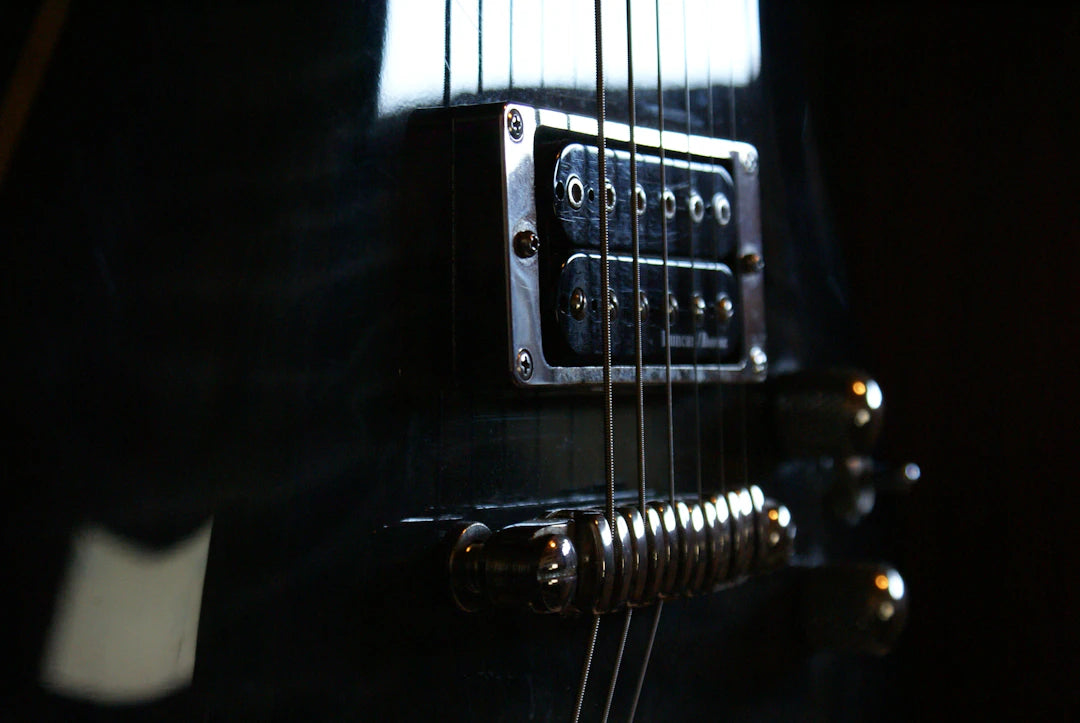Overview
Learn the importance of guitar pickups and recognize signs for replacement, such as inconsistent output, loss of tone, and buzzing noises. Discover how to test pickups, what to consider when choosing replacements, and whether to DIY or hire a professional. Timely replacement enhances sound quality and performance, ultimately prolonging your guitar's lifespan.
Frequently Asked Questions
1. What are guitar pickups?
2. How can I tell if my guitar pickups need replacing?
3. What should I look for in replacement guitar pickups?
4. Can I replace guitar pickups myself?
5. What are the benefits of timely pickup replacement?
Guitar pickups are vital components of your instrument, translating the string vibrations into electrical signals to create sound. Over time, wear and damage can affect their performance, leading to a less-than-satisfactory playing experience. Understanding when it's time to replace your guitar pickups is crucial for maintaining sound quality. In this article, we’ll explore the signs your guitar pickup needs replacement, how to identify these issues, and why addressing them promptly can elevate your sound. Let’s dive in!
The Importance of Guitar Pickups
Before we delve into the signs of a failing guitar pickup, let’s highlight their importance. Guitar pickups capture the vibrations from the strings and convert them into electrical signals. There are several types, including single coil and humbuckers, each offering unique tonal characteristics. The best Stratocaster pickups, for example, are essential for achieving that classic sound associated with rock, blues, and country music.
Common Signs Your Guitar Pickup Needs Replacement
1. Inconsistent Output Levels
One of the most significant indicators that your guitar pickup is nearing the end of its life is inconsistent output levels. If you notice that some notes are louder or quieter than others, this could be a sign of wear. Check the pickup height and try adjusting it first; if that doesn’t help, it might be time for a replacement.
2. Loss of Tone and Clarity
Another major red flag is a noticeable loss of tone and clarity. If your guitar sound has become muddled or lacks the brightness it used to have, it could be due to a failing pickup. This issue is particularly common with older or heavily used pickups that may have internal damage or worn-out magnets.
3. Physical Damage
Inspect your guitar pickups visually. Cracks, dents, or any physical damage can affect their functionality. If you see corrosion or rust on the components, this can significantly degrade performance. Damage can occur due to environmental factors like humidity, temperature fluctuations, or even drops and impacts during transport.
4. Buzzing or Humming Noises
Unwanted buzzing or humming sounds through your amplified signal can indicate a problem with your guitar pickups. These noises might stem from grounding issues or faulty wiring. However, if they persist and don’t resolve with adjustments, your pickups might need to be replaced to restore a clean, clear sound.
5. Dead Notes
If you are finding certain notes don’t register when you play, this could mean that those pickup coils are dead. A quick way to test this is to tap the pickup gently with a metal object while your amp is on and turned up. If there’s no sound, it’s a clear sign the pickup is no longer functioning properly.
6. Intermittent Sound Problems
Sometimes, your pickups may work but show intermittent issues. This could manifest as a sudden drop in volume or a total mute that comes and goes while playing. These erratic problems usually indicate that an internal component is failing and could be symptomatic of issues that require a pickup replacement.
How to Test Your Guitar Pickups
Understanding how to test your guitar pickups can help you diagnose issues before they become severe. Here are a few steps you can take to evaluate their condition:
- Visual Inspection: Check for physical damage, corrosion, or signs of wear.
- Tapping Test: With your amp on, lightly tap each pickup with a metallic object. You should hear a clear sound. No sound indicates a problem.
- Pickup Height Adjustment: Experiment with the height of your pickups. Too Low or too high can affect sound quality.
- Wiring Examination: Inspect for any frayed or loose wires connected to the pickup and the output jack.
- Multimeter Testing: If you have a multimeter, you can measure the resistance of the pickup. Much lower than the standard for that pickup type could indicate an issue.
What to Look for in Replacement Pickups
If you’ve determined it’s time to replace your guitar pickups, there are several key factors to consider:
Type of Pickup
Different styles of music require different pickups. If you're aiming for that iconic Strat sound, you should look into the best Stratocaster pickups available. Understanding your musical style can guide you in selecting the right type.
Output Level
Consider the output level you want from your pickups. High-output pickups can deliver a more aggressive sound, while lower-output options are typically better for cleaner tones. Think about what matches your playing style and preference.
Material and Construction
The materials used in pickup construction affect tone and durability. Alnico magnets are popular for their warm sound, while ceramic magnets have started gaining traction for their bright character. Research which materials complement your guitar and music genre.
Brand Reputation
Choosing a reputable brand can make all the difference in quality and longevity. Look for reviews and recommendations from fellow musicians to ensure you pick a reputable product.
DIY vs. Professional Replacement
Once you’ve selected the new pickups, you can decide whether to handle the replacement yourself or seek professional help. Here are some considerations for each option:
DIY Replacement
If you opt for a DIY approach, ensure you have the necessary tools and skills. It can be quite rewarding to learn how to replace your own pickups. Various online tutorials are available that can guide you through the process. However, be sure to take great care in handling wiring and connections to avoid any mistakes.
Professional Replacement
If you are not comfortable with electronics or guitar maintenance, it’s best to seek professional help. A qualified technician can not only ensure your pickups are installed correctly but can also provide additional insights on setup and maintenance.
The Benefits of Timely Pickup Replacement
Replacing your guitar pickups at the right time can significantly enhance your overall playing experience. Here are some perks of staying ahead of replacement:
- Improved Sound Quality: Fresh pickups lead to a noticeable enhancement in tone, clarity, and volume, ultimately giving you a more enjoyable playing experience.
- Enhanced Performance: A well-functioning pickup enhances your instrument's performance, making it easier to achieve your desired sound.
- Increased Lifespan of Other Components: Timely replacement can prevent further issues that might arise from a failing pickup affecting other electronic components.
- Better Resale Value: Keeping your guitar in top condition, including the pickups, maintains its value should you decide to sell or trade it in the future.
Heroic Moves for Every Guitarist
Taking action and knowing when to replace your guitar pickups is key to ensuring that your instrument sings beautifully for years to come. Whether you spot signs of wear or simply want to upgrade to the best Stratocaster pickups, being proactive about maintenance will keep your sound optimal. Remember to trust your instincts; if you’re noticing any of these signs, take the time to assess your pickups and consider replacement options.
So, get out there, tune up your guitar, and create the music you love to play. Happy strumming!
Linked Product
Odyssey Traditions 1957 Stratocaster Pickup Set
The Odyssey Traditions 1957 Stratocaster Pickup Set offers a vintage tone that can enhance the sound of your guitar, making it a suitable replacement when your current pickups start to underperform. Designed for easy installation, this set can help restore clarity and responsiveness, which are often signs that it's time for an upgrade. Musicians looking to maintain or improve their instrument’s sound quality will find this set to be a practical solution.
View Product










